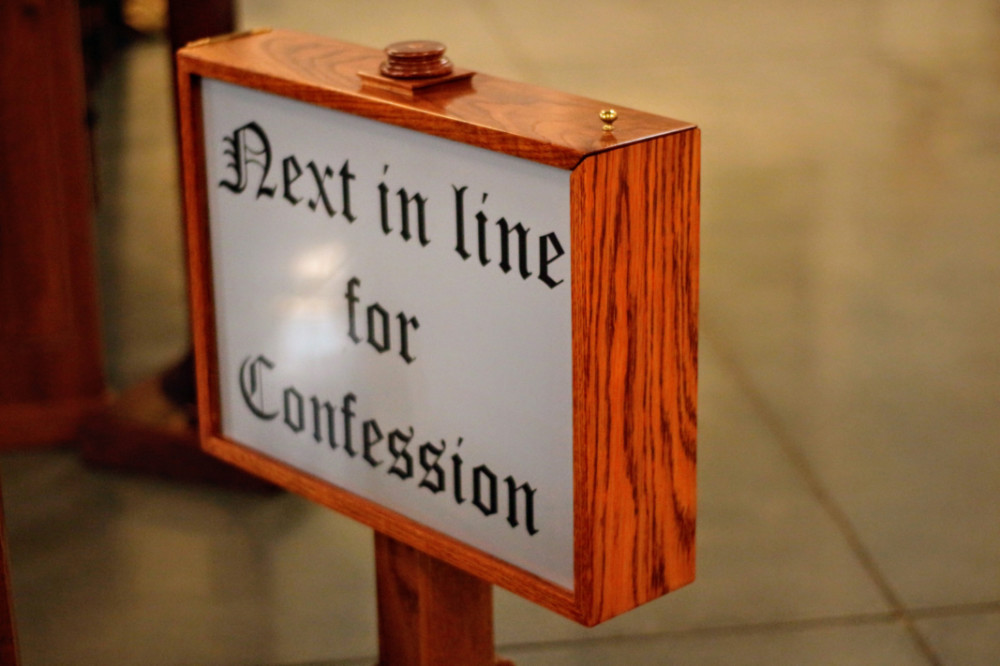
SKYE JETHANI, in an article first published on Religion News Service, looks at the importance of the practice of confession…
Having spent 15 years traveling and speaking to groups across the landscape of American religion, I’ve realised the Christian discipline of confession – while common among Catholics, Anglicans, mainline Protestants and Orthodox believers – is largely absent in my own evangelical tradition.
Attend an evangelical church in the United States and you are more likely to find cushioned theater seats than a liturgy of confession or hear a prayer of repentance. And while other churches use Lent to reflect on their sinfulness in preparation for Easter, few evangelical churches acknowledge Lent at all, preferring to bypass the solemn season in favour of weekly “celebrations” more appealing to religious consumers.

PICTURE: Shalone Cason/Unsplash/Creative Commons
The 40 days of Lent have historically been a season for Christians to engage in confession and repentance. Lenten fasting (which has turned into giving up an indulgence like sweets or Netflix) was merely a way to facilitate self-examination by eliminating distractions and focusing on one’s inner life rather than outward comforts.
Lent is like an annual checkup for Christians; a time to take inventory of one’s soul, clean out any accumulated muck and prepare to receive God’s grace anew at Easter. Of course, this healthy practice of self-reflection is not limited to one season or one religion. And many Christian traditions rehearse the rhythm weekly with a corporate prayer to confess how “we have not loved [God] with our whole heart, and we have not loved our neighbours as ourselves.”
“Lent is like an annual checkup for Christians; a time to take inventory of one’s soul, clean out any accumulated muck and prepare to receive God’s grace anew at Easter. Of course, this healthy practice of self-reflection is not limited to one season or one religion. And many Christian traditions rehearse the rhythm weekly with a corporate prayer to confess how ‘we have not loved [God] with our whole heart, and we have not loved our neighbours as ourselves’.”
Evangelicals ignore Lent and avoid confession not because they don’t believe in admitting their sins. Asking for forgiveness, after all, is part of putting one’s faith in Jesus Christ. But for many white evangelicals, this is a one-time event at conversion. Some may confess in their private prayers, but the corporate practice of confession is often dismissed as an “empty ritual,” “too Catholic” or unnecessary because “God forgave all of my sins – past, present and future – on the cross.”
This confuses confession as something we do for God’s sake, instead of a practice commanded by God for our sake. It misses the formative power of confession to shape us into more humble, self-aware and empathetic people.
The evangelical aversion to confession first occurred to me 20 years ago, when I was serving as a pastor in a mostly white, suburban church. A mentor with decades of experience in a similar setting warned me against focusing on sin, confession or any other “negative” topics. When I reminded him the Bible is full of “Thou shalt not…” commands, he advised me to “preach positive” instead.
This meant inverting the command against adultery into a message about the beauty of monogamy, flipping warnings about greed into the goodness of generosity and avoiding anything about judgment altogether.
Watching what’s happened to the evangelical movement since then, I now wonder if its fixation on positivity over penitence has been even more malforming than I feared. Without disciplines like corporate confession and Lent, there is little within popular evangelicalism to restrain the triumphalism of white American culture from overshadowing the cross of Christ.
When self-examination isn’t valued and cultivated, it’s all too easy to see Christian faith as a battle between external agents of good and evil rather than an internal struggle against my own sin. Without self-awareness the great threat to the faith is always from those on the outside, never the existence of the transgressions of those on the inside.
Could this explain, at least in part, why so many evangelicals appear susceptible to conspiracy theories and Christian nationalism, which also present the world in absolute categories of “us” against “them”?
Of course, the challenge is not limited to my own evangelical tradition. Given the pandemic and political trauma of the last year – and the growing distrust citizens have toward one another – perhaps we need a national season of self-reflection and confession.
Perhaps an American Lent – a time to fast from partisan media, to cease from blaming others, would make us mindful of the words of Vaclav Havel: “The line between good and evil does not run clearly between us and them, but through each person.”
I sense that need in my own soul, and perhaps such a season will cause all of us to take seriously Jesus’ command to remove the log from our own eye rather than focus on the speck in our brother’s.
Skye Jethani is a writer and speaker, co-host of the Holy Post podcast and author of “What If Jesus Was Serious?”






